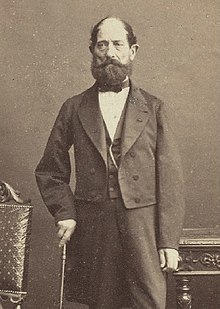Ahmed Hamdi Pasha
Appearance
(Redirected from Ahmet Hamdi Pasha)
Ahmed Hamdi | |
|---|---|
 | |
| Grand Vizier of the Ottoman Empire | |
| In office 11 January 1878 – 4 February 1878 | |
| Preceded by | Ibrahim Edhem Pasha |
| Succeeded by | Ahmed Vefik Pasha |
| Personal details | |
| Born | 1826 |
| Died | 1885 |
Ahmed Hamdi Pasha (Ottoman Turkish: احمد حمدی پاشا) (1826–1885) was an Ottoman monarchist, administrator and conservative statesman during the First Constitutional Era.
Biography
[edit]He was the governor of İzmir from 1873 to 1874.[1] From 1875 to 8 May 1876, and from 1880 to 1885, he was the governor of Damascus, Syria.[2][3][4] In 1876 he was also the governor of Shkodër, Albania for a brief period.[5]
He served shortly as Grand Vizier of the Ottoman Empire from 11 January 1878 to 4 February 1878 during the Russo-Turkish War (1877–1878).
The Sultan Abdul Hamid II[6] dismissed him upon pressure of the Young Ottomans during the First Constitutional Era.[7][8]
He is buried in Beirut, Lebanon, in Bachoura cemetery.
References
[edit]- ^ Nezar AlSayyad (2001). Hybrid Urbanism: On the Identity Discourse and the Built Environment. Greenwood Publishing Group. pp. 65–. ISBN 978-0-275-96612-6.
- ^ Zachs, Weismann (2005-03-24). Ottoman Reform and Muslim Regeneration. Bloomsbury Academic. ISBN 978-1-85043-757-4.
- ^ Mehmet Süreyya (1996) [1890], Nuri Akbayar; Seyit A. Kahraman (eds.), Sicill-i Osmanî (in Turkish), Beşiktaş, Istanbul: Türkiye Kültür Bakanlığı and Türkiye Ekonomik ve Toplumsal Tarih Vakfı, pp. 590–591, ISBN 9789753330411
- ^ Fischbach, Michael R. (2000). State, Society, and Land in Jordan. BRILL. ISBN 978-90-04-11912-3.
- ^ Fatos Baxhaku; Karl Kaser (January 1996). Die Stammesgesellschaften Nordalbaniens: Berichte und Forschungen österreichischer Konsuln und Gelehrter (1861-1917). Böhlau Verlag Wien. pp. 449–. ISBN 978-3-205-98470-2.
- ^ "突厥历史人物—SULTAN ABDÜLHAMİD THE 2ND苏丹阿卜杜拉哈米德二世 - 【Türk Tarıx】突厥史 - Tarıx Bölüm 历史版块 - 中国撒拉尔 - Powered by Salars.cn/BBS". Archived from the original on 2011-07-24. Retrieved 2011-01-02.
- ^ "Arabs and Young Turks".
- ^ Devereux, 240; Mümtaz Soysal, 100 Soruda Anayasa’nın Anlamı (İstanbul: Gerçek, 1969), 28.
